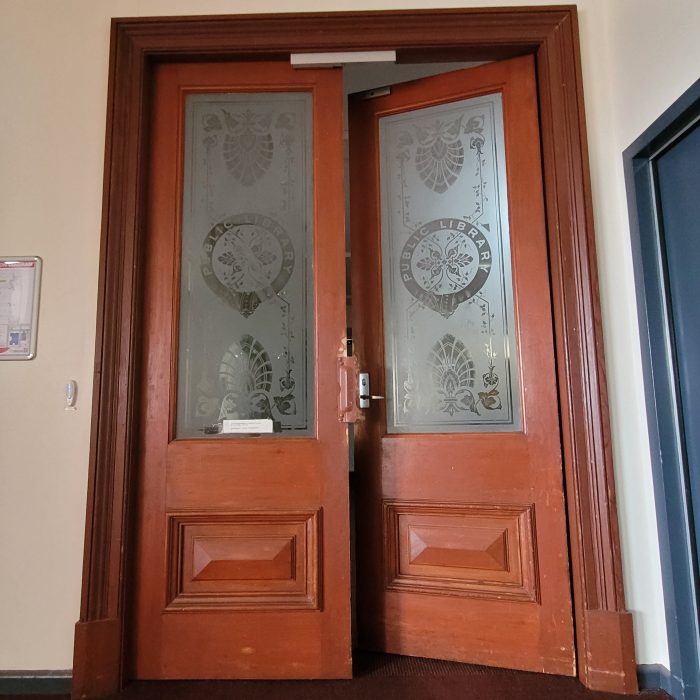Richmond history in the library: babies, bands and dodgy librarians

I co-host In Those Days with Christina Adams. In the podcast we read digitised newspapers from Trove, the National Library of Australia’s digital repository. The premise of In Those Days is that I’m a library nerd who does the research then shares articles with Christina and a guest.
We usually record at the State Library Victoria’s recording studio. It’s a great facility but you can only book two hours per day. So earlier this year we completed a residency at the Richmond Library Makerspace, a multi-purpose recording and editing studio. The residency gave us a lot more time in the studio to explore local history with our guests.
Our guests were a mix of Richmond locals and people with professional or personal expertise on Richmond-based topics.
A theme of every episode was how community services and the arts have changed (and stayed the same). In our first episode historian Mary Carroll discussed the first public library at Richmond Town Hall, which held books and periodicals. Public libraries today provide information in many formats including digital, audio and video. Mary Carroll pointed out that libraries still provide free access to resources and space to use them. This was the fundamental, radical ideal of the first public libraries, which has not changed.
An idea that may be genuinely new(ish) for public libraries is that libraries are now places for creation rather than just consumption of information. Public libraries today help people make things. They provide spaces, materials, technology and expertise that facilitate artistic creation (and podcasts). Below is some more information about the episodes we made.
In Those Days Richmond episodes
In The Library with the Professor
Our first guest was library historian Associate Professor, Mary Carroll. While reading articles about the first public library in Richmond in the Town Hall we discussed some hot button library topics including: qualified teacher librarians, silence, and Mills and Boon.
I’d never met Mary before we recorded, and I was nervous about talking to a real historian. But Mary was delightful and I would have talked to her all day about libraries but she had to get to Wagga Wagga that afternoon and you aren’t allowed to kidnap people.
My highlight was when I asked Mary whether libraries were quiet spaces in the 19th century and she replied “I don’t know, I wasn’t there.” A refreshing burst of historian honesty.
The Globe Theatre with Damian Callinan
Star of stage and screen Damian Callinan was our guest to talk about stages and screens in Richmond in the olden days.
Damian is a very versatile performer and writer who has tried and suceeded at almost every artform. He’s also been a guest on a lot of podcasts and he threatened to steal the synthesizer as payment.
We discussed articles about the Globe Picture Theatre, which was built in 1912 on the site of the current Richmond Library. The theatre was used for films and for vaudeville performances and was fascinating to hear Damian’s view on whether they were any good.
We talked about a vaudeville performer, Harry Hoddinot, who performed (badly) at the Globe but then moved to Broken Hill. On a major tangent, I got my school friend Tim Carruthers to bring to life the sheet music of Hoddinot’s song, ‘We’re Going Back Back Again to Broken Hill’ and he tried to make me sing it.
Band Blasts from the Past and Present
Musician and educator, Adam Arnold talked to us about brass bands in Richmond. We uncovered some uncanny parallels between Adam’s current bands and the Richmond Boys Brass Band started 100 years earlier.
I was very interested in Adam’s definition of talent as “an absence of boundaries”. Honestly, I didn’t understand at first, but after he explained I became a convert.
We also heard from one of Adam’s current students, Scarlett O’Heeler, about playing in one of Adam’s bands.
Baby Expert Depot
Some of the first services for mothers and babies in Australia were started in Richmond. We read articles about early infant welfare services and my friends Jo Rosenberg and Vaya Pashos compared these to their experiences of Maternal Child Health services.
Afterwards, proper oral historian, Carla Pascoe-Leahy, talked to us about how ideas around mothercraft have changed over the past 100 years. Carla is very knowledgeable and reassuring about why talking about motherhood is hard.
We had many logistical issues while recording this episode, but like all modern parents we bravely juggled on.
Crime in the Library
We ended the series where we started. In the library.
Julianne Negri came in to talk about library work and crime. Julianne is an author, artist, library worker and Trove-lover and in this episode she applied her incredible skill set to solving cold-case crimes from the Richmond Library.
We discovered money in a cupboard, corrupt council dealings and a violent assault on the librarian by an ex-mayor of Richmond. We cracked all the cases and I had to edit out a lot of giggling.
Please share!
All our guests for this series were extremely generous with their time and information. I think they said interesting stuff, so I’d love more people to listen. If you know someone who’s interested in libraries, history, true-crime, Richmond, music, books, parenthood or dodgy librarians please recommend In Those Days to them!